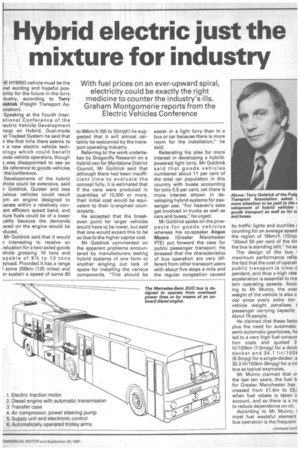Hybrid electric just the mixture for industry
Page 33

If you've noticed an error in this article please click here to report it so we can fix it.
With fuel prices on an ever-upward spiral, electricity could be exactly the right medicine to counter the industry's ills. Graham Montgonnerie reports from the Electric Vehicles Conference
-IE HYBRID vehicle must be the ,ost exciting and hopeful posbility for the future in the lorry dustry, according to Terry oldrick (Freight Transport As)ciation).
Speaking at the Fourth Interational Conference of the lectric Vehicle Development roup on Hybrid, Dual-mode id Tracked System he said that ir the first time there seems to a a new electric vehicle techology which could benefit Dods vehicle operators, though a was disappointed to see so tle reference to goods vehicles the'conference.
Developments of the hybrid ahicle could be extensive, said
Goldrick. Quieter and less Dxious vehicles could result om an engine designed to Derate within a relatively conant efficient speed band, and iture fuels could be of a lower Jality because the demands aced on the engine would be iduced.
Mr Goldrick said that it would a interesting to receive an taluation for a two-axled goods 3hicle grossing 16 tons and apable of 91/2 to 10 tons 3yload. Provided it has a range I some 200km (125 miles) and in sustain a speed of some 80
to 88km/h (50 to 55mph) he suggested that it will almost certainly be welcomed by the transport operating industry.
Referring to the work undertaken by Dragonfly Research on a hybrid van for Maidstone District Council, Mr Goldrick said that although there had been insufficient time to evaluate the concept fully, it is estimated that if the vans were produced in quantities of 10,000 or more, their initial cost would be equivalent to their ic-engined counterparts.
He accepted that the breakeven point for larger vehicles would have to be lower, but said that one would expect this to be so due to the higher capital cost.
Mr Goldrick commented on the apparent problems encountered by manufacturers testing hybrid systems of one form or another singling out lack of space for installing the various components. "This should be easier in a light lorry than in a bus or car because there is more room for the installation," he said.
Reiterating his plea for more interest in developing a hybridpowered light lorry, Mr Goldrick said that goods vehicles numbered about 11 per cent of the total car population in this country with buses accounting for only 0.5 per cent, yet there is more interest shown in developing hybrid systems for passenger use. "For heaven's sake get involved in trucks as well as cars and buses," he urged.
Mr Goldrick spoke on the prospects for goods vehicles whereas his co-speaker Angus Munro (Greater Manchester PTE) put forward the case for public passenger transport. He stressed that the characteristics of bus operation are very different from other transport users with about five stops a mile and the regular congestion caused by traffic lights and suchlike counting for an average speed the region of 16km/h (10mp "About 50 per cent of the tirr the bus is standing still," he sa The design of the bus maximum performance reflei the fact that the cost of operati public transport is time-d pendent, and thus a high rate acceleration is essential to ma tam n operating speeds. Accol ing to Mr Munro, the over weight of the vehicle is also c cial since every extra ton vehicle weight penalises t passenger carrying capacity about 16 people.
He claimed that these facto plus the need for automatic semi-automatic gearboxes, ha led to a very high fuel consuri tion costs and quoted a lit/100km (7.5mpg) for a doub decker and 34.1 lit/100k (8.3mpg) for a single-decker, a 35.3 lit/100km (8mpg) for a mi bus as typical examples.
Mr Munro claimed that o) the last ten years, the fuel b for Greater Manchester has creased from £1.4m to H.: when fuel rebate is taken ir account, and so there is a n€ to reduce dependence on oil.
According to Mr Munro, I most fuel wasteful element bus operation is the frequent












































